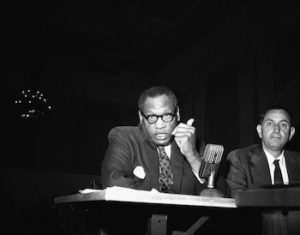
Paul Robeson testifying
*On this date in 1938, the House Un-American Activities Committee (HUAC) was formed. The HUAC was created to investigate alleged disloyalty and subversive activities on the part of America’s private citizens, public employees, and those organizations suspected of having Communist ties.
The House Committee on Un-American Activities was established as a special investigating committee, reorganized from its previous incarnations as the Fish Committee and the McCormack-Dickstein Committee, to investigate alleged disloyalty and subversive activities on the part of private citizens, public employees, and those organizations suspected of having communist or fascist ties; however, it concentrated its efforts on communists.
It was chaired by Martin Dies Jr. (D-Tex.) and is therefore known as the Dies Committee. The National Archives and Records Administration holds its records related to HUAC. In 1938, Hallie Flanagan, the head of the Federal Theatre Project, was subpoenaed to appear before the committee to answer the charge that the project was overrun with communists.
Blacklisted African Americans included: Paul Robeson, Canada Lee, Lena Horne, Langston Hughes, Richard Wright, Hazel Scott, Artie Shaw, Dean Dixon, Clifford Durr, Shirley Graham, Josh White, Hilda Simms, Ossie Davis, Ruby Dee, and others were outlawed by the HUAC. In 1939, the committee investigated the leaders of the American Youth Congress, an affiliate organization of the Communist International.
The committee also put together an argument for the internment of Japanese Americans, known as the "Yellow Report." Organized in response to rumors of Japanese Americans being coddled by the War Relocation Authority (WRA) and news that some former inmates would be allowed to leave camp and Nisei soldiers to return to the West Coast, the committee investigated charges of fifth-column activity in the camps.
Several anti-WRA arguments were presented in subsequent hearings, but Director Dillon Myer debunked the more inflammatory claims. The investigation was given to the 77th Congress and alleged that certain cultural traits, such as Japanese loyalty to the Emperor, the number of Japanese fishermen in the US, and the Buddhist faith, were evidence of Japanese espionage. Except for Rep. Herman Eberharter (D-Pa.), the committee members seemed to support internment and its recommendations to expedite the impending segregation of "troublemakers," establish a system to investigate applicants for leave clearance, and intensify Americanization and assimilation efforts, broadly aligning with WRA goals. In 1946, the committee considered opening investigations into the Ku Klux Klan but decided against doing so, prompting white supremacist committee member John E. Rankin (D-Miss.) to remark, "After all, the KKK is an old American institution."
Instead of the Klan, HUAC concentrated on investigating the possibility that the American Communist Party had infiltrated the Works Progress Administration, including the Federal Theatre Project and the Federal Writers' Project. Twenty years later, in 1965–1966, however, the committee investigated Klan activities under the chairmanship of Edwin Willis (D-La.). From 1969 onwards, the House Committee on Un-American Activities (HCUA) was known as the House Committee on Internal Security. It was an investigative committee of the United States House of Representatives. The committee's anti-communist investigations are often compared with those of Joseph McCarthy, who, as a US Senator, had no direct involvement with this House committee. When the House abolished the committee in 1975, its functions were transferred to the House Judiciary Committee.